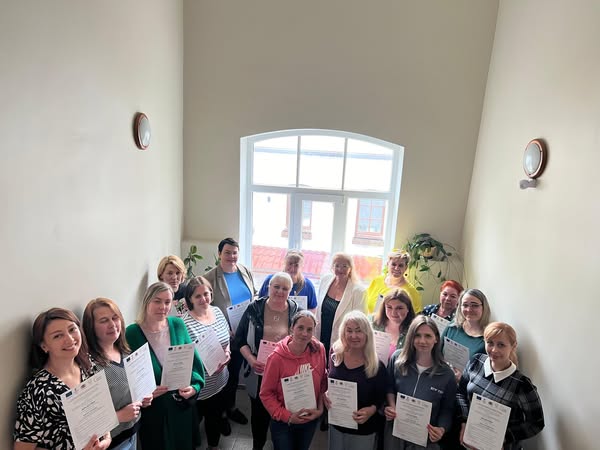Activities of the Project “Society of Opportunities” in the Second Quarter of 2025

In the second quarter of 2025, the Society “Intellect Park” organized training sessions on societal diversity and intercultural communication as part of the project “Society of Opportunities. Intercultural Communication Training for Professionals from Various Fields to Strengthen the Framework for the Integration of Third-Country Nationals”, No. PMIF/13.4./2024/1/01. These sessions were held for employees of preschool institutions of Daugavpils Ķīmija District and Antūži Primary School.
Employees from the Daugavpils Ķīmija District preschools participated in a 40-hour intercultural communication course held weekly on Thursdays between 15 May and 12 June 2025. Meanwhile, an intensive 32-hour course was conducted at Antūži Primary School from 16 to 19 June 2025.
In the thematic module “Main Grounds of Discrimination and Principles of Its Prevention”, lecturers Dr. paed., Assoc. Prof. Sandra Zariņa and Mg. psych. Irēna Žukovska introduced participants to various forms and expressions of discrimination. The sessions included analysis of discriminatory situations, real-life examples and practical solutions for preventing discrimination in educational institutions. In the module “Hate Speech and Hate Crimes”, lecturer PhD, Assoc. Prof. Igors Trofimovs provided in-depth insight into the relevance of these concepts in today’s society, examined the legal framework and discussed potential preventive measures.
In another session titled “Cultural Competence and Understanding Cultural Norms”, led by Dr. philol., Assoc. Prof. Ingrīda Kupšāne, the participants deepened their understanding of cultural processes in Latvia and developed skills necessary for effective intercultural interaction. These classes enhanced participants’ ability to appreciate cultural differences, value diversity and adapt their professional practice to support inclusive education. To further strengthen awareness of stereotypes and prejudices, the participants engaged in a discussion with a guest lecturer Valeriy Kremenchucki, a third-country national. Another guest lecturer, Oleksiy Zaričanskyi, led a session on aspects of international law and professional ethics, emphasizing their significance when working with people from different cultures. The course concluded with an advanced module presented by the project’s lead lecturer, Dr. philol., Professor Maija Burima, who offered a focused perspective on the social identity issues of third-country nationals. The session aimed to improve the participants’ awareness of identity formation processes and their impact on interpersonal communication in a diverse society.
When filling out the satisfaction surveys, participants acknowledged that the course not only broadened their horizons but also provided valuable knowledge and skills they could apply in their daily work. “Everything was very interesting!” wrote one of the participants, while others added: “A very warm atmosphere, everyone was supportive. A heartfelt gratitude for the course!” The course was especially appreciated for its diverse approach, which included not only theoretical knowledge but also practical tasks and discussions that helped participants grasp important social topics.
Participants emphasized that the courses improved their understanding of discrimination and taught them practical tools for addressing it in their daily work. “Thank you for giving us the opportunity to hear from third-country nationals – I have never had such a chance before. It was very valuable,” one comment read. Attendees greatly appreciated hearing different cultural perspectives, which helped broaden their views on cultural diversity and societal inclusion. “It was very interesting and diverse. I received more than I expected,” one participant admitted. Others described the sessions as “educational” and “useful for life”. They also noted that the courses helped them understand existing social stereotypes and behavioral models. “The lecturers and topics made me reflect on unfamiliar social stereotypes and behavior patterns,” said one participant. The practical tasks, which participants planned to use in their work, were also particularly praised: “There were many practical exercises I will use in my own work.” Participants expressed their “great appreciation for the time spent together and the knowledge gained,” emphasizing that the course contributed not only to their professional skills but also to personal growth.
Employees from both educational institutions were the first to participate, under the guidance of the project’s lead lecturer, Dr. philol. Prof. Maija Burima, in piloting newly developed educational materials – educational films. These videos include interviews with third-country nationals and integrate topics on gender equality and anti-discrimination principles. Based on the videos, participants examined various integration and adaptation scenarios, discussing ways to improve cooperation and productive information exchange. The educational materials developed within the project “Society of Opportunities. Intercultural Communication Training for Professionals from Various Fields to Strengthen the Framework for the Integration of Third-Country Nationals” are a valuable resource that will be used to improve the course content. A total of four educational films are planned to be made within the project.This publication was created with the support of the Asylum, Migration and Integration Fund.
The content of the publication is the responsibility of the Daugavpils University Society “Intellect Park” for Lifelong Learning, Culture, and Science Communication.
Project funding: CO-FINANCED BY THE EUROPEAN UNION
Asylum, Migration and Integration Fund – 75%, Latvian state budget – 25%.

